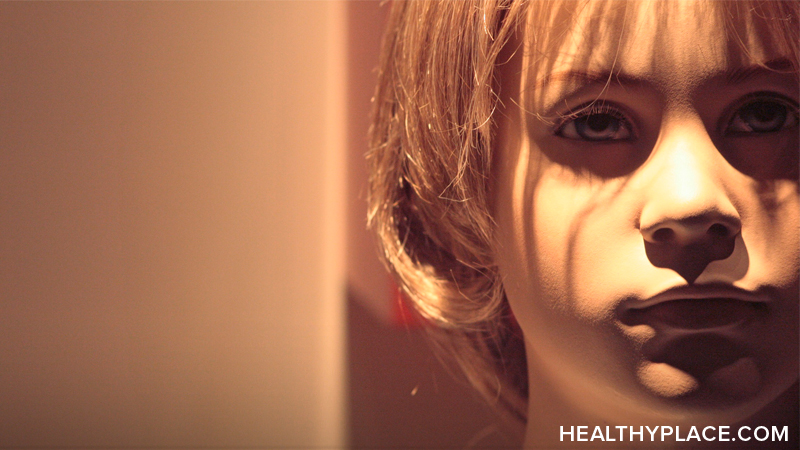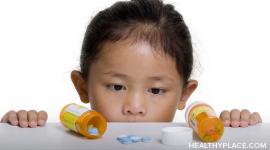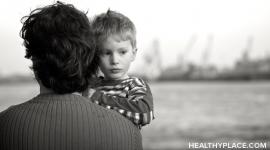Childhood Bipolar Disorder: Growing Up A Bipolar Child

I am twenty-eight years old as I write these words. I was diagnosed with childhood bipolar disorder at the age of twelve. Sixteen years has passed since the diagnosis yet it still feels recent−particularly when I am asked what life was like living with a serious mental illness at such a young age.
When I am asked what childhood bipolar symptoms I exhibited and experienced that led to the diagnosis, I have to stop and think. I have to remember that time in my life−that frightening time−in order to paint a picture of what bipolar disorder looked and felt like, and the impact it had on my family life. Sometimes, it's easy to forget that mental illness, in all of its shapes and forms, is a family disease and each member suffers in his or her own way.
I have been blessed with a wonderful family and my mother−the strongest woman I have ever met−asked if she could contribute her experience to this article. She wanted the opportunity to speak from a parent's perspective and what it was like being a parent of a bipolar child. As is the case with all of life's stories, I must start at the beginning; I must take myself back to that scary time in my life.
Childhood Bipolar Disorder Affected Everyone
My Parents Knew Something Was Wrong
My mother tells me that she knew I was different before she even laid eyes on me. I did somersaults in her womb, kicking hard, unlike my two siblings. I came into this world screaming, and I never stopped. The doctor told my parents I was colic—a simple term describing a newborn that is otherwise healthy, even thriving, but screams for no reason, expresses symptoms of distress.
Five years later, able to walk and talk, I would not sleep—I could not sleep. I lay in my tiny bed and kicked the walls. I screamed and I cried and my parents knew something was wrong. Something, my mother tells me, was not right. My siblings were younger than me, one two years younger and one five, and my behavior affected the family dynamic immensely. We could not enjoy dinner together because I could not sit still. Although I was young, I remember a feeling of extreme agitation, an angry energy I could not rid myself of. A distinct feeling that I was different than my siblings.
By the age of seven, my behavior had become more destructive. I am ashamed to admit that I was abusive to both my siblings and our pets. My mind was like an engine that pushed my young body. I felt completely out of control. I was completely out of control. My parents tried to integrate me into my peer group; they enrolled me in baseball and soccer and figure skating. When I was manic, I would decide I wanted to join these teams and my parents, elated, would pay for it. I was never able to attend more than a few of the events, my anxiety was so high that I had trouble breathing and talking to people.
Family History of Bipolar Disorder
My family tree is populated with people who have been diagnosed with bipolar disorder, severe depression, anxiety disorders and, sadly, more than a few suicides. Mental illness runs rampant in both my mother and father's side. Armed with this knowledge, my parents took me to the first psychiatrist at the age of ten. Diagnosing childhood bipolar disorder (aka juvenile bipolar disorder) was rare at the time, and though the psychiatrist listened to my mother and father speak, describing my childhood bipolar symptoms, he simply told them they were bad parents. He was adamant that they were not disciplining me properly. In other words: I was not mentally ill, it was their fault. This experience is shared by many parents who have tried to help their children. Nobody wants to believe a child, innocent and still new to the world, can have a serious mental illness.
Being Told You're A Bad Parent
I asked my mother what it was like, that first meeting, being told that it was their fault and she told me in no uncertain terms, that she and my father felt it was there fault. They believed this professional, believed in the various medical degrees hanging on his wall, and took his advice: They sent me to my room and told me I had to sit quietly for ten minutes. They had tried this before. I ran up and down the stairs with energy that could not be explained and so "sitting" and being "quiet" were not things that were possible for me. As soon as the door shut, I would lie on my back and start kicking it. I would kick until the wood splintered and cracked, the handle falling to the floor, and then scream that I was going to jump out the window.
I tore all of my clothes off the hangers; I threw things out my third story window, ripped off the wall paper with my hands and tore up my favorite books. I was like an animal, only I was caged in my mind and my parents could not reach me. It became clear that my actions were not a result of "bad parenting" as both my siblings were stable and thriving−as much as they could be amongst my madness. I was admitted to a children's psychiatric hospital at the age of twelve. I remember being terrified and wondering what was wrong with me. I wanted to be like my brother and sister; I wanted to go to school and make friends and smile! Being a child with a serious mental illness is frightening, disruptive, and above all else, it can feel hopeless. I am blessed that my parents never gave up on me but they did, as the years went on, lose faith in those who refused to believe I had a mental Illness.
We saw our fair share of mental health professionals−during this time I was in and out of hospital −before we found one who listened to my parents and who listened to me describe how utterly scared I was. After many meetings discussing what was going on, she sat our family down one day and told us she had come to a diagnosis. She had a lovely office painted in pinks and in blues, the walls lined with books and large windows, it's strange the things we remember. But I will always remember the look on her face, both serene and matter of fact---a look that tells you that you will soon receive good news or bad news. In our case, a bit of both.
Natalie Has Bipolar Disorder
She stated: "Natalie has bipolar disorder." My mother remembers this being first immensely sad but also relieved. At last someone believed them! And maybe, they hoped, I could become well now. I cannot imagine how difficult this was for them, but I do recall my being confused. I had heard the words before − "bipolar disorder", but I wasn't really sure what they meant. I wondered: "Will I die?" "Will I get better?" and simple things, things that indicated I was just a child, I wondered if I could go to school like my siblings.
Above all else, I wanted to be normal. I wasn't sure what that meant, but I knew it was something I was not. Being diagnosed with a mental illness at a young age affects the way you view yourself and the world. You are not sure who you are. You wonder: Am I just an illness or am I really me? The diagnosis of mental illness is confusing at any age, but even more so when you are a child who just wants to be like other children.
Having received the childhood bipolar diagnosis just before my thirteenth birthday was both a blessing and a curse. I spent half of the year in the children's hospital trying out new medications like they were new shoes. Some of them worked but most of them did not. The side-effects were often terrible and before the medication had a chance to work, I would refuse to take it. At the age of fifteen, when I had nearly given up and I felt too tired to fight anymore, I felt the life draining out of me. With each month that passed in the hospital, I started to get better.
Waiting for Bipolar Recovery
My recovery from childhood bipolar disorder was not easy, and it was certainly not easy for my family. Although I was in hospital during this time so they could monitor any serious side-effects, all of us were waiting. We were waiting for the medications to stop working like they had in the past; we were waiting for me to become unwell. When you live with a mental illness the word "waiting" takes on new form. It is the purple elephant in the room. It is a terrifying word, a state of being, but hopeful as well. At this point, after over a decade of illness, any reprieve would be a blessing.
The months passed slowly, soon I was sixteen, and had started to believe that perhaps I was getting better! It was the simple things that people take for granted: I was able to get out of bed in the morning or fall asleep at night. I could maintain eye contact and my level of anger, rage, and confusion had lessened. Becoming well was difficult, after all, I had never been well and I had no idea what it felt like. I wondered: "Is this what being normal feels like?" It was a lonely time for me. I spent much of my time thinking about how other kids were in school, going to Halloween dances, and I was still staring at the bleak hospital walls or the light blue wallpaper in my bedroom at home.
My mother tells me the family was equally frightened. I had had very brief periods of stability in the past and had become ill quickly after. The nature of bipolar disorder is particularly cruel. But, she tells me now, this time was different. She could see it in my eyes; in the way my body moved, neither too quickly or slow. For the first time, my family thought I might make it.
A few more months passed and the bipolar medications I was taking---mood stabilizers and an antidepressant---continued to work. I continued to get better. When I think of this time I connect it to images and to colors: it was both bright and dark. I see myself crying, my knees to my chest on my bed, wondering if it would stay this way. If I would stay this way. I picture myself smiling the first time I found out I would be going to college after working hard to catch up on the education I had missed. But life was not suddenly easy. I felt alone in my struggle; never had I met another child with bipolar disorder, not even in the hospital. It's different now—the prevalence of children with mental illness is more recognized and more (though certainly not enough) support is available to families in need.
Bipolar Disorder Very Isolating for Everyone
My mother remembers this time in a way I do not: She was afraid, as I was, but for the first time she felt she was able to get to know me. My other family members felt the same. I was no longer defined by the cycle of bipolar disorder, the damage it caused, but was able to relate to people. I was suddenly a sister, a daughter, a student, and above all, a young woman trying to figure life out. The years following my stability were a time of healing in my family. Though I struggled with guilt; with the memories of the abuse I caused when sick, but slowly, as the years have passed, I have been to accept the illness.
Later in life, in my early twenties, I struggled with addiction. I believe it was a way for me to escape the memories of being a child and being so sick. The addiction was as hard on my family as the onset of mental illness was. Addiction is dark and frightening but, somehow, I found my way home to them.
My life now is a balancing act; my medication works well, but I still falter in the winter months. I am sober and am doing what I love: Writing and running and being part of the world. Part of my family. I suppose that's the most important part---children with mental illness can and do recover and, in the process, we find out who we really are. And I believe I have.
About the author: Natalie Jeanne Champagne is the author of The Third Sunrise: A Memoir of Madness. She is also an author of the Recovering From Mental Illness Blog on HealthyPlace.com.
APA Reference
(2021, December 28). Childhood Bipolar Disorder: Growing Up A Bipolar Child, HealthyPlace. Retrieved
on 2026, March 5 from https://www.healthyplace.com/bipolar-disorder/bipolar-children/childhood-bipolar-disorder-growing-up-a-bipolar-child




